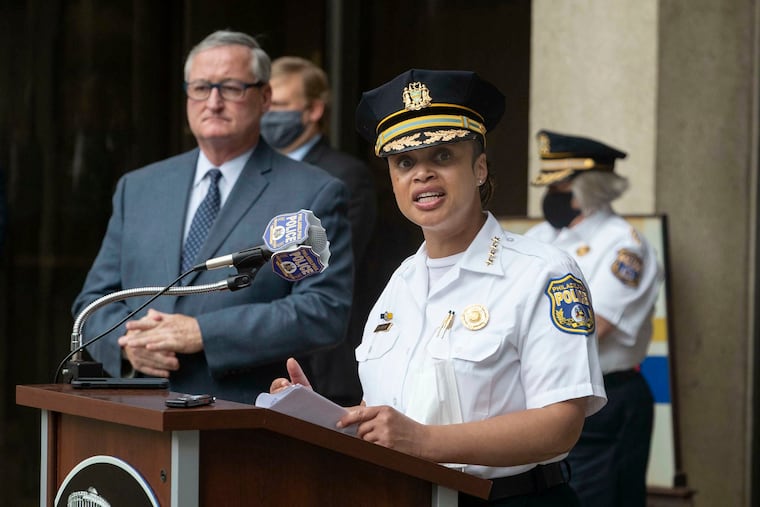Danielle Outlaw put in an untenable position by Kenney administration | Opinion
To ensure the overall safety of Philadelphia’s citizens and their neighborhoods, emergency management in Philadelphia County should be immediately reassessed.

Amid calls last month for Police Commissioner Danielle Outlaw to tender her resignation for mishandling the response to summer protests following the death of George Floyd at the hands of Minneapolis police, it’s important to consider that she is not the only person at fault here.
Commissioner Outlaw, who had only been on the job for a few months when the protests began, was put in an untenable position by this administration. From my view, as a former managing director, the Kenney administration allowed the new police commissioner to handle large-scale protests without some of the best practices and institutional knowledge that previously determined how the city handled crisis situations.
» READ MORE: Danielle Outlaw’s failure should push Kenney to ask for her resignation — but she didn’t fail alone | Editorial
Not long after James S. White was appointed managing director in July 1985, under Mayor W. Wilson Goode Sr., he tasked me with putting together the emergency operations center (EOC). It was in direct response to the lack of preparedness that allowed the MOVE confrontation to occur. I subsequently built an emergency operations notification system that the city utilized throughout the next two decades.
During my tenure, as the managing director under Mayor Edward G. Rendell, we instituted an Emergency Management Operations Group (EMOG). It included a departmental representative from each of the operating departments. We created contingency plans, for preempting a variety of emergency scenarios, including civil unrest. The EMOG met regularly and the representatives met at the EOC on short notice when and if an emergency was imminent or evident, to create an operations plan. We were prepared to present each plan to the mayor, if he requested it. The model was used successfully in preparing for all kinds of emergencies and major special situations like severe weather, major fires, water main breaks and flooding, municipal work stoppages, transit strikes, civil disturbances, derailments, CBRN incidents (chemical, biological, radiological, nuclear events), special events that required broad municipal support (like Y2K), and other things.
Why is it that the Kenney administration was not prepared for the uprising that occurred after George Floyd’s murder? Why aren’t questions being asked about preparedness in general? Why is the fire commissioner appointed as county emergency management coordinator?
During the administration of Mayor John F. Street, a full examination of the city’s emergency management was commissioned by the mayor and Philadelphia City Council and a report was presented to the City Council president through the Managing Director’s Office. I don’t know if this report was consulted during the days of the Floyd protests, but I do believe that if it had been followed, the results would have been different.
One specific recommendation made in the immediate aftermath of MOVE was that the uniformed services (police or fire) not be in overall charge of emergency management. This was also a recommendation of the emergency management assessment commissioned by Mayor Street and City Council. It was further recommended that emergency management be coordinated through the Office of the Managing Director working closely with Pennsylvania Emergency Management Agency (PEMA).
» READ MORE: The ‘twice as good’ rule for Black leaders brings unfair scrutiny to Danielle Outlaw | Solomon Jones
To ensure the overall safety of Philadelphia’s citizens and their neighborhoods, emergency management in Philadelphia County should be immediately reassessed. A high-ranking commission appointed by the mayor and City Council should be charged with evaluating municipal preparedness and response for major emergencies, including the possible need for evacuation. Municipal assets and critical infrastructure must be reevaluated with the goal of continuation of critical municipal services and safety of citizens. Police Commissioner Outlaw should convene a police/community relations council made up of community leaders to assist with weighing the impact of implementing policy decisions on the affected neighborhoods.
It is important, in government, to draw upon best practices and continue to carry forward lessons learned from after-action reports. It keeps from having to reinvent the wheel, each time there’s a need to respond to a major disruption.
Hopefully, there will be a review of past best practices, in addition to an examination of the current status of emergency preparedness. Uniformed services must be overseen and managed by qualified civilians with an all-government approach to municipal emergency management. Don’t scapegoat the new police commissioner.
Joseph Certaine was the city’s assistant managing director from 1987 to 1990, deputy managing director from 1991 to 1994, and managing director from 1994 to 2000.